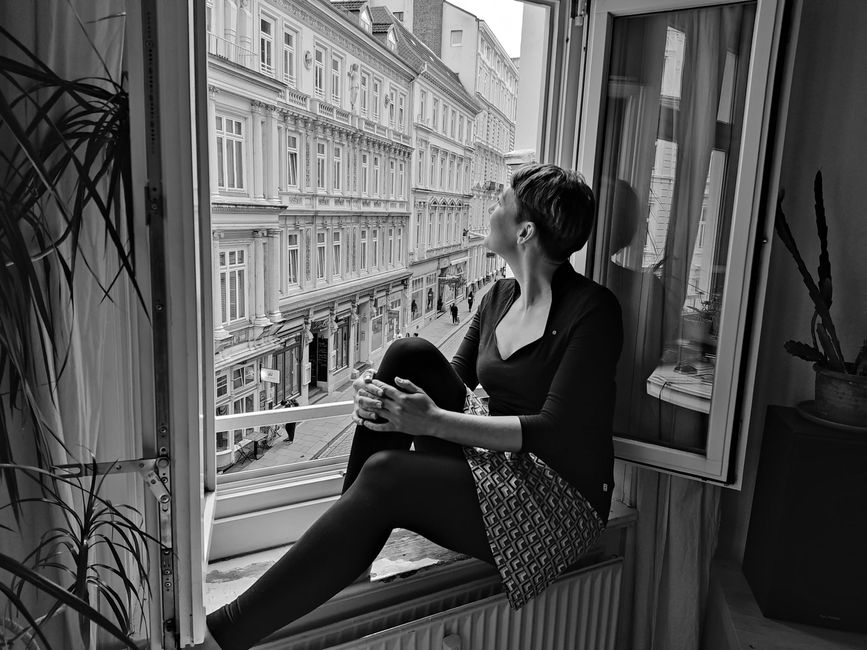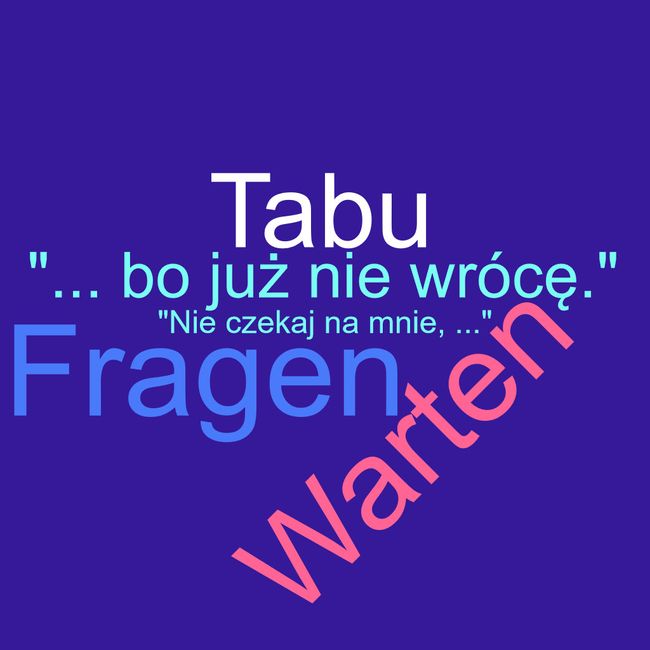
Mit Geschichte(n) um die Welt
vakantio.de/mitgeschichteumdiewelt
'Don't wait for me, because I won't be coming back.' Or: Monika, Franz, and a family secret
Çap edildi: 09.07.2023
Habar býulletenine ýazylyň
In autumn 2020, I found Monika. She has been living in the UK for many years, but she was born in Poland. She is a trained English teacher, and she currently works in the office of a vehicle rental company. When she only received short-term contracts at schools in Poland 17 years ago and then no extended contract came, she wanted to try her luck in England. She wanted to see London at some point anyway. "Just a year on the island." Although she couldn't work as a teacher there, she spoke English every day. She met her ex-partner and soon had a daughter. She stayed.

She speaks with a wonderful British-English accent, I notice when we order coffee and switch from Polish to English. I didn't remember her exact address, somewhere near London. I wrote to her without checking my notes beforehand. I only remembered that she had moved some time ago.
Shortly after my request to meet, an immediate "yes" came back. And also that she would gladly come to London for the 1.5-hour train ride; she just felt like meeting me.
In response to my offer to come to her, she objected that I have already searched for and found her and her family enough in space and time, so the effort for her would be fine.
Monika's (family) story is exciting. And even more so, how it has changed over the course of the research; somehow uncovered, almost decluttered and somehow exposed.
The beginning was the death of her grandmother in 1988, about 35 years ago, a year before I was born. Monika was about 16 years old at the time.
She found documents about her grandmother rather coincidentally, Monika helped her mother apply for the death certificate. She collected the data, place of birth, date, spouse, the things you need to take care of paperwork when someone passes away. Among them, Monika found a marriage certificate of her grandmother with Franz, her first husband.
She copied down all the data, just out of curiosity. Monika and her relatives knew - as did she - that her grandmother's first husband had been murdered by the Germans in Auschwitz in 1945.
That's the story.
Monika made various search inquiries for Franz, her grandmother's first husband. From the archives of the Auschwitz Memorial, she quickly learned that there were no records of the name she was looking for. She tried the Polish Red Cross. After about a year, the answer came: nothing here either, but at least the promise that they would contact her if they ever found anything about this Franz. That was in the early 1990s.
It took a long time, years, until 2001, when Monika received another response, this time from the International Tracing Service in Bad Arolsen, a close partner of the Polish Red Cross.
The information about Franz was written in English and (even more) in German; nothing in Polish. So Monika couldn't understand much. There was also no one she could ask to translate the German parts. The letter was set aside, for someday, and forgotten.
Monika didn't think about it for a long time. At some point, there was a conversation within the family about her grandmother, about Franz, and she remembered that there was something about it. Where was that German-English response letter again?
By that time, she had already been in England for a long time. She wanted to search for it on her next visit to Poland. And take it to England. By now, there was Google Translate, which could help at least a little. Monika's ex-partner had worked in Germany for a while, he could at least translate "cemetery," cmentarz. Strange. Why a cemetery in Germany?
Google did help, but there were so many abbreviations that it was still incomprehensible. Only one thing was clear: Franz did not die in Auschwitz in 1945. He was never imprisoned in Auschwitz either. And he survived the Nazi era.
He stayed in Germany, remarried - although he was already married - to a German woman.
Of all people! He lived in Upper Franconia from around 1947. Franz was registered as a displaced person in various DP camps, including Flossenbürg. That's how I came across him, his name, and also Monika.

I "knew" him mainly as Franciszek and found him interesting for several reasons. The Germans arrested the 34-year-old shortly after the occupation, in November 1939. From 1940, the father of three was in several prisons and concentration camps, and he was liberated in Ebensee, Upper Austria.
The SS had held him in the concentration camp as an "S.V. prisoner," a so-called "security detainee." This was a category of prisoners in the concentration camps that has been less extensively researched, and there are also fewer personal accounts from these individuals, because they were stigmatized as criminals and antisocial even after 1945. For a long time, hardly anyone was interested in this group of people, and the survivors themselves rarely spoke up, could not or did not want to, because the negative labeling and tagging continued to stick to them.
However, this category often did not correspond to the National Socialists' and SS's perceptions.
As I wrote in an article: "Already in the 1970s, the International Tracing Service reported that in the Mauthausen concentration camp complex [where Franz was also held], Poles who had been registered as 'security detainees' or 'professional criminals' were usually not 'multiple offenders': 'They were given this designation because they had previously been imprisoned in penitentiaries or prisons for political reasons such as listening to enemy radio broadcasts, preparing high treason, violations of war economic regulations, and even for non-political offenses.'"
[Cf. Reply to request, ITS to Bronisław K., 2.11.1976, Arolsen Archives, ITS Digital Archive, 6.3.3.2/110018796. and more: Sarah Grandke, Moving memories – memories on the move? Initiativen of the displaced persons in Flossenbürg in 1946/47, in: Contributions to the History of Nazi Persecution (ed. KZ-Gedenkstätte Neuengamme), 2022, pp. 45-64.]
And you can also find this about Franz/Franciszek. He was sentenced to four years in prison for preparing high treason. After that, there were prisons, penal camps, and concentration camps. After his liberation by the Americans, he was taken to Bavaria via various stations in the spring of 1946, a year after the end of the war. When I found out that he had children and lived in Bavaria until his death in the 1990s, I wanted to at least try: maybe he left behind some records? Or photos? Or something else?
It was worth a try.
Because I also found it interesting that he married a German woman after the war. This was often completely scorned in Polish post-war society (and often also among the DPs). Getting involved with the enemy, even long after 1945 (as well as during the war), was an absolute taboo for many.
I didn't find anything more about Franz's "German" family, but I found something about his Polish family, and that's how I found Monika.
Why it was said in Monika's family and even by her grandmother herself that Franz had been murdered in Auschwitz is unclear to Monika as well. Everything is just speculation. But through many connections and inquiries, she was able to find an older relative who still remembered something. There had once been a letter from Franz, shortly after the war, and it was found after her grandmother's death. In it was the sentence:
"Nie czekaj na mnie, bo już nie wrócę."-
"Don't wait for me, because I won't be coming back."
The letter doesn't exist anymore today; the aunt didn't want it to be read, not even by Monika.
Was it easier for Monika's grandmother to declare Franz dead rather than live with the certain, perceived, or actual shame that her husband would not come back? That he had decided against returning to Poland? And then marrying another woman, a German?
Possible.
But maybe it was completely different. Neither Monika nor I can say. We asked too late. And even if someone had asked 30, 35, 40 years ago, maybe there wouldn't have been any answers back then either. Nevertheless, Monika was close. Franz died four years after her grandmother, in 1992. He is buried in a cemetery in Upper Franconia, about 60 kilometers from the former DP camp Flossenbürg.
Habar býulletenine ýazylyň
Jogap

Syýahat hasabaty Angliýa
